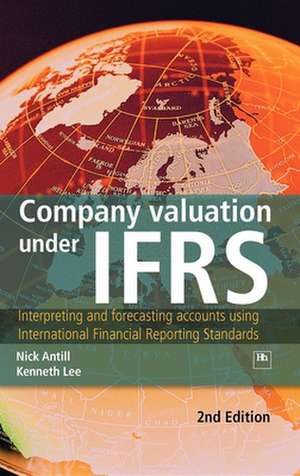Company Valuation Under IFRS: Interpreting and Forecasting Accounts Using International Financial Reporting Standards
Autor Nick Antill, Kenneth Leeen Limba Engleză Hardback – 11 iun 2008
Written by practitioners for practitioners, the book addresses valuation from the viewpoint of the analyst, the investor and the corporate acquirer. It starts with valuation theory: what is to be discounted and at what discount rate? It explains the connection between standard methodologies based on free cash flow and on return on capital. And it emphasizes that, whichever method is used, accurate interpretation of accounting information is critical to the production of sensible valuations. The authors argue that forecasts of cash flows imply views on profits and balance sheets, and that non-cash items contain useful information about future cash flows - so profits matter.The book then addresses the implications for analysis and valuation of key aspects of IFRS.
Preț: 240.27 lei
Nou
Puncte Express: 360
Preț estimativ în valută:
45.98€ • 49.93$ • 38.62£
45.98€ • 49.93$ • 38.62£
Cartea nu se mai tipărește
Doresc să fiu notificat când acest titlu va fi disponibil:
Se trimite...
Preluare comenzi: 021 569.72.76
Specificații
ISBN-13: 9781905641772
ISBN-10: 190564177X
Pagini: 406
Ilustrații: illustrations (black and white)
Dimensiuni: 165 x 232 x 33 mm
Greutate: 0.86 kg
Ediția:Revised
Editura: HARRIMAN HOUSE LTD
ISBN-10: 190564177X
Pagini: 406
Ilustrații: illustrations (black and white)
Dimensiuni: 165 x 232 x 33 mm
Greutate: 0.86 kg
Ediția:Revised
Editura: HARRIMAN HOUSE LTD
Notă biografică
Nick Antill Since 2000, Nick has divided his time between training and consultancy in the areas of energy and finance, and currently works as an associate of BG Training and as a consultant for Citigroup. Previously, he spent 16 years in the City of London as an equity investment analyst specialising in European energy companies, finishing as head of the European team at Morgan Stanley. He began his career in the oil industry, where he worked as an economist with BP and Saudi Aramco. Previous publications include (with Robert Arnott) 'Valuing oil and gas companies'. Kenneth Lee In what now seems like a previous life, Kenneth was an accountant and tax consultant with Arthur Andersen in Dublin. He then held various positions in the financial training business culminating in becoming the accounting specialist at BG training. There he trained analysts from all the major banks and published 'Accounting for Investment Analysts: an international perspective'. In 2009, Kenneth joined Barclays Capital as Deputy Head of European equity Research and lead analyst on Accounting Research. He is a fellow of the Institute of Chartered Accountants in Ireland, a member of the Securities Institute of Taxation in Ireland and a CFA charterholder.
Cuprins
Chapter One - It's not just cash; accounts matter 1. Introduction - Valuation refresher 2. Distributions, returns and growth 3. Cash, accruals and profits 4. The Economic Profit model 5. The real world of specific forecasts 6. Introducing debt Chapter Two - WACC - Forty years on 1. Risk and Return 2. Diversification and portfolio effects 3. The problem of growth 4. Leverage and the cost of equity 5. Building in tax shelters 6. Time varying WACC 7. The walking wounded - real options and capital arbitrage 8. International markets and foreign exchange rates 9. Conclusions on discount rates Chapter Three - What do we mean by 'return'? 1. IRR versus NPV 2. Calculating CFROI 3. Another approach: CROCI 4. Uses and abuses of ROCE Chapter Four - Key issues in accounting and their treatment under IFRS 1. Revenue recognition and measurement 2. Stock options 3. Taxation 4. Accounting for pension obligations 5. Provisions 6. Leasing 7. Derivatives 8. Fixed assets 9. Foreign exchange Chapter Five - Valuing a company 1. Building a forecast 2. Ratios and scenarios 3. Building a valuation 4. Frequent problems 5. Three period models 6. Conclusions regarding basic industrials Chapter Six - The awkward squad 1. Utilities 2. Resource extraction companies 3. Banks 4. Insurance companies 5. Property companies Chapter Seven - An introduction to consolidation 1. Introduction 2. Treatment of Investments 3. Methods of consolidation 4. Further issues in consolidation 5. Accounting for associates and joint ventures 6. Purchase accounting and uniting of interests 7. Foreign subsidiaries 8. Accounting for disposals 9. Modelling mergers and acquisitions Chapter Eight - Conclusions and continuations 1. Conclusions 2. Continuations Further reading Appendices IAS or IFRS in, or coming into, force IFRS in Emerging Markets Chinese Accounting Standards - major differences with IFRS Analysis formulae Index
